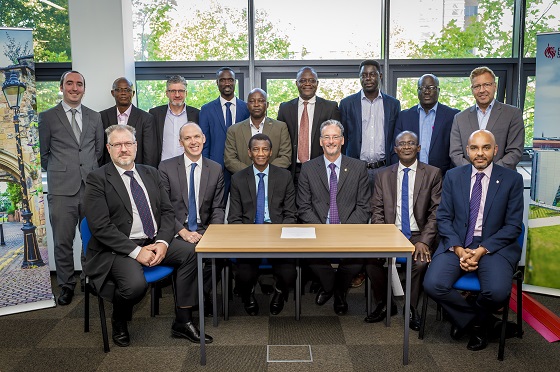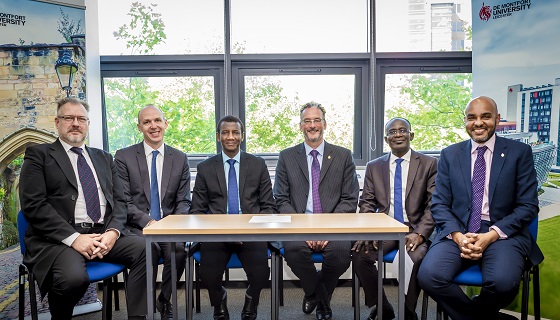A new partnership will see De Montfort University Leicester (DMU) empowering a nation through education by helping establish The Gambia’s first university of technology.

DMU announced this week that it is working with Kwame Nkrumah University of Science and Technology in Ghana, the Finnish Education Group and The Gambia’s government to support the creation of a new university of science, engineering and technology in mainland Africa’s smallest country.
The Gambia has a huge skills gap and the government wants a university that not only nurtures future researchers and experts in these fields, but encourages graduates to build new businesses that create job opportunities for all.
The Honourable Badara Joof, The Gambia’s Minister for Higher Education, Science, Research and Technology, DMU Interim Vice-Chancellor Prof Andy Collop and Kwame Nkrumah University Vice-Chancellor Prof Kwasi Obiri-Danso signed the partnership agreement in Leicester last week.
Honourable Minister Joof said: “There are a lot of universities in the UK but we settled for DMU because we realised this is a university that has a connection between what you do in the classroom and entering the world of work.
“Employability at DMU is very high and we want people from that field to help us make a difference. DMU, Kwame Nkrumah and Finnish Education Group have experiences that will enrich us.
RELATED NEWS
Be inspired. Come to the next DMU Open Day
Young Gambians rebuild their lives with help from DMU
African football stadium cheers on DMU grad as she promotes science
“In a world driven by science and technology, The Gambia needs an institution like this and you will help us achieve this. We can now make a solid start by teaching the scientists of the future in our country. This is just the beginning. We are in this for the long haul to create a great centre of excellence.”
Vice Chancellor Obiri-Danso, who sees many Gambians leave their country to study sciences at his university, added: “I am excited to be in the UK today. We all share a connection that we were brought up by the British as part of the Commonwealth and there is always an opportunity to improve things by going back to our roots.
“We want to create future scientists and engineers but we want scientists and engineers who are capable of creating jobs in their country. That is what excites me.”
DMU’s involvement in the project started a couple of years ago when its Director of the Centre for Academic Innovation, Dr Momodou Sallah, heard about plans for a new university. He organised a meeting with the Honourable Joof to outline how DMU could help.

Dr Sallah, who was born and raised in The Gambia, has formed close connections between DMU and his home country through the Global Hands project, which send his students to work on schemes to make them work ready. He then worked with DMU’s Prof David Mba, PVC Dean of the Faculty of Computing, Engineering and Media, to help create the partnership.
Dr Sallah said: “DMU is an international university and is committed to meeting the United Nations Sustainable Development Goals (SDG). This partnership addresses SDG 16, which aims for peace, justice and strong institutions.
“We can give people in The Gambia an education that will help themselves. That is the best contribution we can make. DMU is looking to empower a nation through education.
“It will also be a reciprocal partnership with exchange programmes between lecturers to help us all develop new ways of teaching.”
Prof Mba said: “I am incredibly proud that DMU has signed this partnership to create a new university of science, engineering and technology in The Gambia.
“It not only recognises DMU as a truly global university but also acknowledges our world class teaching and research in science and engineering. I look forward to working closely with our academics to ensure The Gambia has a university that will transform lives and become an institution the nation can be proud of.”
Earlier this year it was reported how staff and students at DMU were helping young people who have returned to The Gambia to integrate back into their communities, after they risked their lives trying to migrate to Europe.
Since 2017, more than 3,000 youths have been sent back to The Gambia, after attempting to reach Europe via the difficult and dangerous ‘backway’ through Libya, because they have lost hope in a future in their homeland.
Posted on Monday 23 September 2019